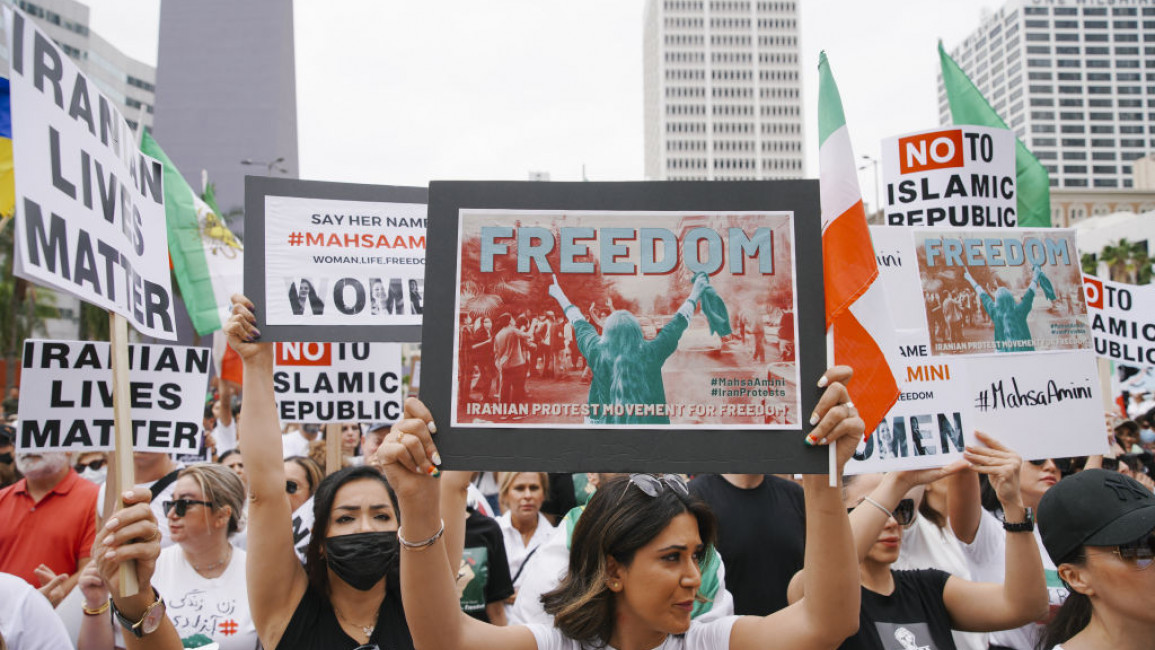
Sections of the Iranian diaspora are undermining the fight for freedom in Iran
The Iranian diaspora has always been a dynamic collective characterised by its revered prodigies: accomplished entrepreneurs, scientists, scholars, artists and business magnets. Its sporadic episodes of dormancy and inertia aside, this sprawling community is reputed to be universally successful.
Even the former US President Donald Trump, who once described Iran, “a terrorist nation”, couldn’t hide his admiration for the league of Iranian-Americans. In a 2017 message on the occasion of Persian New Year, Nowruz, Trump said: “For many years, I have greatly enjoyed wonderful friendships with Iranian-Americans, one of the most successful immigrant groups in our country’s contemporary history.”
The US Census Bureau data confirms that Iranian-Americans are trailblazers in educational attainment nationally. And in other countries, it’s no different. The aggregate net worth of Iranian expatriates is estimated to exceed $1.3 trillion, even though a tiny fraction of this opulence is remitted “home.”
''The sizeable bloc of the expatriates, however, gradually drifted away from its virtuous mission. It found itself bogged down in antics that in hindsight, the actors will most probably construe as flawed decision-making and sentimentalisms that only sowed frictions and betrayed the ideal all Iranians are fighting for: freedom.''
The death of Mahsa Amini in the custody of the Islamic Republic morality police and the avalanche of anger and defiance that followed, soon becoming a universal uprising, and represented a juncture when the diaspora found an urgent motive to redefine its identity. Expats were persuaded to converge around a common cause, sympathise with the people of their motherland and sculpt a new public footprint for themselves, one of awareness, connectivity and relevance.
Within a short span, social mobilisation went into high gear, solidarity campaigns bloomed and the articulation of support peaked in the demonstrations of October 1. On that eventful day, Iranians took to the streets in some 150 cities worldwide to accentuate the bonds of fraternity with those on the streets of Tehran, Isfahan, Rasht, Kermanshah and Zahedan risking their security to stand up for dignity and freedom.
In Canada, the York police reported at least 50,000 protesters marched in Richmond Hill in a phenomenal freedom rally organised by Iranian-Canadians, whose sophistication and introversions often get in the way of them uncloaking unity in such plentiful numbers.
It was with the sustained engagement of the diaspora, fuelled by the devotion of activists at home, that the hashtag for the name of Mahsa Amini garnered upwards of 270 million tweets and generated immeasurable interactions on Instagram. Their role was instrumental in raising public awareness of what was unfurling in Iran and was eclipsed by neglect and unconsciousness toward an incommunicado population in the early stages of their crusade.
This women-led upheaval and the inflection point it bred was no less reminiscent of the “I can’t breathe” Black Lives Matter revolution that jolted not only the United States but the entire world in the aftermath of the killing of George Floyd. His murder became the crescendo for people’s exhaustion with injustice and set in train a reappraisal of racism, discrimination and power abuse.
In Iran, the latest instance of police brutality fanned the flames of public wrath but it did not immediately receive a lot of publicity. In the absence of independent local media and under the shadow of the government’s wall-to-wall dragnet of critical voices, the diaspora facilitated the parallels of the Black Lives Matter movement and the newly-born “woman, life, freedom” bandwagon to be communicated to a global audience.
The sizeable bloc of the expatriates, however, gradually drifted away from its virtuous mission. It found itself bogged down in antics that in hindsight, the actors will most probably construe as flawed decision-making and sentimentalisms that only sowed frictions and betrayed the ideal all Iranians are fighting for: freedom.
After protests and social media campaigns that were forward-looking blueprints, calls for incremental sanctions against Iran began percolating on the internet and letters were sent to different governments demanding the intensification of sanctions. Who is there to assert that Iranian people haven’t been the collateral damage of decades of grinding sanctions and their lives haven’t been shattered by these punitive measures?
The literature on the dire human costs of the sanctions is so unvarnished and explicit that even the current and former US government officials such as Jack Lew and Richard N. Haass have argued against their overuse because it dilutes their effectiveness and causes civilian suffering.
And then, the most unexpected transpired. A group of Iranians overseas launched a petition calling on the members of the G7 and other countries across the world to sever diplomatic relations with Iran. More than 370,000 people have signed this petition as of this writing. However surreal and vengeful this initiative may sound, its architects have passionately vouched for the proposal, defending it as the right step. It is not.
While the Iranian government navigates avenues to curtail the ties of its 85 million people with the outside world, this is lending it a hand and erecting an even more fortified wall around the country and catapulting its people into utter isolation.
In the playbook of the diasporic miscalculations, perhaps the most unethical approach is waging a prejudicial war against disparate voices implanting nuance in the discourse on Iran. Tens of prominent journalists, academics, commentators and activists have become the subject of trolling, abuse and calumny because they write or speak in terms that are not as radical as the opposition in exile demands.
From distinguished correspondents covering Iran to professors, a multi-layered smear campaign has been in the making, centred on challenging their credentials, and painting them as covert agents of the government. Evidence doesn’t need to be presented for the accusations trotted out.
This has sadly compelled many of these noted individuals to start justifying themselves, saying how hard they have fought for democracy in Iran, how many articles they have published criticising the clerical establishment, and what consequences they have faced speaking out.
Amidst all of this mudslinging, if someone is earmarked for vilification, they should be prepared to receive oceans of defamatory, obscene messages on their social media from those expats who claim they are the only ones genuinely caring about the future of the country and others cannot have a say in framing a national narrative. Even worse, threats of retribution and physical violence against the targets, especially women, have been on the ascent.
The Iranian diaspora can indeed incubate substantive change and be an emancipatory force, to complement the democratic aspirations of the Iranian people. But it needs to embrace an introspection. Does the current trajectory what will set the stage for a better Iran belong to all Iranians? It’s naïve to give a positive answer.
Kourosh Ziabari is an award-winning Iranian journalist and reporter. He is the Iran correspondent of Fair Observer and Asia Times. He is the recipient of a Chevening Award from the UK's Foreign and Commonwealth Office and an American Middle Eastern Network for Dialogue at Stanford Fellowship.
Follow him on Twitter @KZiabari
Have questions or comments? Email us at: editorial-english@newarab.com
Opinions expressed here are the author's own, and do not necessarily reflect those of her employer, or of The New Arab and its editorial board or staff.


![Minnesota Tim Walz is working to court Muslim voters. [Getty]](/sites/default/files/styles/image_684x385/public/2169747529.jpeg?h=a5f2f23a&itok=b63Wif2V)




